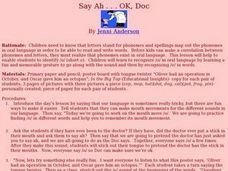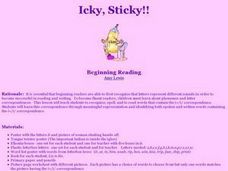Curated OER
Rhyme Rally
Students are introduced to rhyming words and practice identifying them in a story or poem. In this rhyming words lesson, students listen to a story while paying listening for rhyming words in the story. Students then replace rhyming...
Curated OER
A Baby is Crying...Aaa!
Students explore phonemes. They discuss the phoneme /a/ (short a). Students read and write words containing the phoneme /a/. They identify /a/ in written and spoken words. Students recognize the letter symbol for /a/ and find words with...
Curated OER
The B Beat
Students recognize letter b in print and respective phoneme /b/ in spoken words, such as tongue twisters. Students then listen for phoneme in spoken words, and practice writing letter b.
Curated OER
Eddie the Elephant
Students need to practice sight words to become proficient readers. So it is very important for children to learn common correspondences. The phoneme for the letter "e" is practiced in this lesson.
Curated OER
It's O-o-o-obvious That You're Sick
Students experience the phonemes and map spellings of the short vowel /o/ sounds in spoken words. They practice matching letters to phonemes to identify the /o/ representations and letter symbols in words. Students work with the Dr....
Curated OER
The Beautiful Bouncing Ball
Students practice recognizing a letter and its phoneme by utilizing the alphabetic principle while working with and identifying the sounds of /b/. They assess a big book, objects in the room, a timer and the tongue twister, "Billy...
Curated OER
Pick a Picture
First graders practice recognizing words with the short /a/ sound and applying /a/ phoneme in spoken words. They interact with the book, "Pat's Jam," and five picture cards with pictures of a hat, rat, cat, pig and a dog on each one....
Curated OER
Adam's Apples
Students examine the /a/ phoneme in both written and spoken words. They practice finding the /a/ in words, watch how their mouths move when making the sound, and write the letter. Next, they differentiate the sound in words, listen to a...
Curated OER
Say Ah . . . OK, Doc
Students distinguish between letters that stand for phonemes that deal with the short /o/ sound. They study how spellings map out the phonemes in oral language in order to be able to read and write words. Each student practices the...
Curated OER
Fun with Fish!
Students observe the phoneme and digraph /sh/ in spoken words. They discover a meaningful representation and practicie finding /sh/ in words. They read and spell words (using a letterbox lesson) that contain the phoneme /sh/.
Curated OER
Can you cry like a baby?
Students practice the strategies of phonemes and spellings maps to sound out new words. They work on the short vowel /a/ sound with a sentence strip with "Allie the Alligator sat on a mat eating apples," on it and the book, "Cat in the...
Curated OER
Iggy and the Icky Sticky Inchworm
Students read and spell words. They have to recognize that letters stand for phonemes and spellings map out spoken words. Long and short vowels are hard to recognize and this lesson plan focuses on that. The short i is taught in the...
Curated OER
Icky-Sticky
Students practice recognizing the connection between phonemes and letters with an emphasis on finding the short vowel /i/ in words. They each receive a Elkonin letterbox and a picture card with icky-sticky gum on it and the letter i.
Curated OER
Baby Sally is Upset Again!
Learners, assessing how to read and write, join together grapheme's and the phonemes that make up words. They practice recognizing in oral and written form the vowel /a/. The book, "Matt and Rags," is introduced to the students in this...
Curated OER
Say What?
Students explore phonemes in spoken words. They discuss the /e/ (short e) correspondence. Students read "Red Gets Fed." They learn a meaningful letter symbol for the /e/. Students identify /e/ sound in both spoken and written words.
Curated OER
Icky Fingers
Students are introduced to digraphs so they can match letters to their phonemes. They recognize the short vowel i=/i/ in both spoken and written words by practicing reading and spelling words containing /i/. Elkonin Letter Boxes are...
Curated OER
Crying Baby
Students practice techniques and strategies with phonics, spelling and word recognition with the sounds of /a/. They read and work on this task with the book, "Cat Nap," and the tongue twister "Alice asked if Annie's active animals were...
Curated OER
Umbrella's Up!
Students study the /u/ phoneme by determining its sound, reciting a tongue twister, and writing the lower 'u.' Next, they listen to Sue Dickson's, The Umbrella Book, while raising a paper umbrella each time they hear the /u/ sound....
Curated OER
Iiizzy is Iiicky Sticky!
Students answer a series of questions about the different sounds that the letter I makes. They observe a picture about a girl and the letter I. They practice a tongue twister with the different sounds of I. They practice writing the...
Curated OER
Aaaa! The Baby is Crying!
Students discover the correlation between graphemes and phonemes. They distinguish phonemes in verbal word contexts and match the letters to the phonemes. They focus on working to recognize the phoneme /a/ in its oral and written form.
Curated OER
Icky Sticky
First graders the /i/ sound by practicing the way the mouth moves while making the sound while saying "icky, sticky." They write the letter "i" using both upper and lower case letters, make words using letterboxes, and write about a...
Curated OER
U-u-under The U-u-umbrella!
Students practice using phonemes because they need to be able to recognize that phonemes and letters correspond with each other in order to become a proficient reader. The practice is done using the letter "u".
Curated OER
Load the Boat To Travel the Moat
Learners discover that letters stand for phonemes. They determine that spellings map out the phonemes that are found in spoken words. They analyze the correspondence, oa = /O/ and recognize the /O/ sound in spoken and written words in...
Curated OER
Sally Snake
Students study the /s/ phoneme by examining the sound in written and spoken words. They recite a tongue twister, and examine how their mouths move as they make the sound. Next, they write the letter, differentiate the sound in given...

























